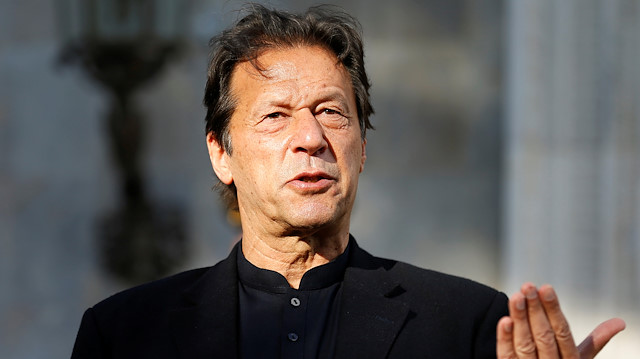
Prime Minister Khan says 'if UNSC can solve East Timor issue, why not Kashmir'
Pakistani Prime Minister Imran Khan said on Friday his country would allow Kashmiris to determine whether they wish to join or stay independent if they vote in favor of Pakistan in a UN-promised plebiscite.
Addressing the "Kashmir Solidarity Day" rally in Kotli area of Azad Kashmir or the Pakistani-administered Kashmir, Khan said: "When residents of Indian-occupied Kashmir as well as Azad Kashmir get the right to self-determination, and when Kashmiris choose Pakistan Insha’Allah, Pakistan will give Kashmir the right to decide whether or not they want to be part of Pakistan or remain independent."
“The whole Pakistan stands with the occupied Kashmir … not just Pakistan but the whole Muslim world stands with people of the occupied Kashmir,” he said.
"If Muslim governments, for any reason, are not supporting you [Kashmiris] today, I can assure you the entire population of the Muslim world is standing with the people of occupied Kashmir," he said.
He urged the UN Security Council (UNSC) to come forward and implement its resolutions on Kashmir.
"The UNSC resolved the East Timor issue because it was an island of a Muslim country and Christians were in the majority there," he said, criticizing the UNSC's silence on the issue of Kashmir.
- No power could defeat public
Khan said no military power in the world could win a war against the public and “India is also facing defeat in Kashmir.”
"India may bring 900,000 army soldiers or even more, but they [India] could not win in Kashmir," he opined.
Referring to the US defeat in Vietnam, Russia in Afghanistan, and France in Algeria, Khan said that even superpowers lost their wars against the public.
- Khan offers India dialogue
Khan asked his Indian counterpart that there is no option with India except to resolve the Kashmir dispute according to UNSC resolutions.
"I ask [Narendra] Modi to restore Article 370 [of the Indian Constitution] in Kashmir and take back all illegal actions taken in August 2019, and then let us start the process of composite dialogue as per the UNSC resolutions,” Khan offered during his address.
"The Rashtriya Swayamsevak Sangh (RSS) ideology has hurt India and divided the country," he said of a prominent Hindu nationalist organization with the ruling Bharatiya Janata Party (BJP) as its political wing.
"Today India's farmers are protesting and the Muslims' condition is in front of everyone because of its discriminatory citizenship laws against them," he said.
- President calls India an ‘irresponsible nuclear state’
Earlier on Friday, Pakistani President Arif Alvi called India an "irresponsible nuclear state" and said New Delhi is "playing with fire."
Addressing Azad Jammu and Kashmir Legislative Assembly to mark “Kashmir Solidarity Day”, Alvi said Pakistanis commemorate the “sacrifices made by brave Kashmiris for freedom against occupied forces of India.”
“Today we want to encourage our Kashmiri brothers and sisters, who are fighting for their freedom, and want to tell them that we [Pakistanis] stand behind them,” the president said.
Their struggle has entered the final phase, and Kashmiris will soon be free, he said.
- Pakistan asks UNSC to implement its resolutions on Kashmir
Pakistan, on the “Kashmir Solidarity Day”, called on the UNSC to ensure implementation of its resolutions to resolve the dispute over Jammu and Kashmir.
In a letter addressed to the UN secretary-general and the UNSC, Pakistani Foreign Minister Shah Mahmood Qureshi asked them to "exercise their legal and moral authority to ensure the implementation of resolutions on the Jammu and Kashmir which guarantee the Kashmiris’ inalienable right to self-determination."
The foreign minister underscored that all “unilateral and illegal measures taken by India in the occupied territory of Jammu and Kashmir in violation of international law including relevant resolutions of the UNSC and the 4th Geneva Convention, such as changes in the demographic structure, usurpation of land and farcical ‘elections’, are null and void.”
- Disputed region
Kashmir, a Muslim-majority Himalayan region, is held by India and Pakistan in parts and claimed by both in full. A small sliver of Kashmir is also held by China.
Since they were partitioned in 1947, New Delhi and Islamabad have fought three wars – in 1948, 1965, and 1971 – two of them over Kashmir.
Also, in the Siachen glacier in northern Kashmir, Indian and Pakistani troops have fought intermittently since 1984. A cease-fire took effect in 2003.
Some Kashmiri groups in Jammu and Kashmir have been fighting against Indian rule for independence, or for unification with neighboring Pakistan.
According to several human rights organizations, thousands have reportedly been killed in the conflict since 1989.


